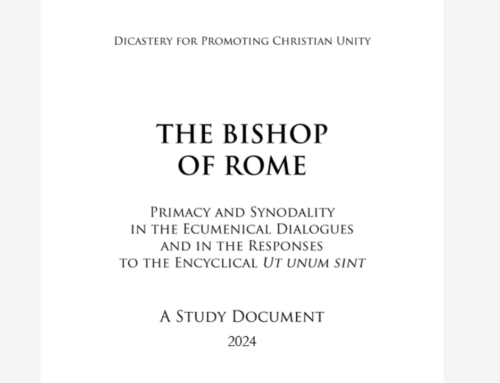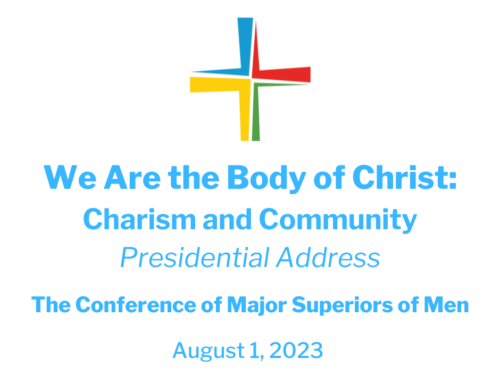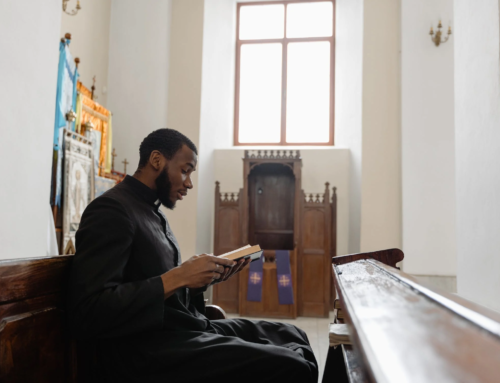Fr. Kenneth G. Davis, OFM Conv., discusses an evaluative question for spiritual directors: how do I know that I am doing what I think I am doing as a spiritual director? Suggesting that ongoing, formal evaluation is a helpful tool for spiritual directors to use, he offers a matrix of terms to define the director/directee relationship, offers a sample evaluation tool, and argues that this tool helps both the director to grow professionally but also to ensure that the directee is getting what they need from their encounters with the director. Click here to download a copy of the essay.
Readers likely research performance reviews before booking a vacation stay or home repair. Readers likely also receive texts or emails after most professional consultations, which begin with statements such as: “We value your feedback. Please take this brief survey.” Performance reviews are common in the business and academic arenas. Such assessments provide information about employee satisfaction, training needs, compensation rates, and promotion. However, church ministers such as spiritual directors are rarely evaluated by their employers, credentialing agency, or those to whom they minister. In a world of YouTube likes and Amazon stars, why are spiritual directors not evaluated?
Some evaluation may occur during supervision (e.g., via critical incidents); however, supervision is usually not focused on the performance of the spiritual director, but rather on the inner experience of the spiritual director while directing another, e.g., countertransference.[1]
This article discusses a simple, but helpful question for spiritual directors: “How do know if I’m doing what I intend to be doing?” It begins with a definition of terms, continues with one example of evaluation, and concludes with personal testimony from the author.
Definition of Terms
Any ministerial relationship is aided by a clear understanding of roles and responsibilities as well as accurate feedback. For example, to elicit constructive critiques some preachers regularly meet with a focus group representative of her or his congregation. For the group to function well, each person must understand the role of the focus group, the goals of preaching as defined by that congregation, and the responsibilities unique to the preacher for achieving those goals. A Catholic parish, therefore, would use Preaching the Mystery of the Faith for a shared understanding of the goals of preaching. At the Sunday liturgy, usually the ordained minister is charged with the goals for the homily outlined there. However, lectors have responsibilities for proclaiming the Word, and others for sound quality. The role of the focus group could be to promote good proclamation of the Word, provide feedback to improve proper sound engineering, or minimize distractions from buzzing light fixtures, dripping air conditioners, or other sounds that could distract from the delivery of the homily, such as loud meal preparations in the building. However, if their role is to help the preacher achieve the goals outlined specifically for him, those goals must be sufficiently described for all to have a common understanding of the evaluation criteria. Only in that way can they provide constructive feedback that doesn’t segue into unrelated points, such as the relative merits of a cry room. Instead, this feedback focuses on the accomplishments and failures of the preacher to reach mutually understood goals, and includes advice about consistently replicating the former and avoiding the latter.
Such a shared understanding of mutually understood goals would also help in the evaluation of spiritual directors. Some may already cringe at the term “direction,” preferring instead descriptors such as spiritual accompaniment or friendship. That is precisely why defining or describing terms in a mutually acceptable way is helpful.
What are the roles and responsibilities of a spiritual direction relationship? What follows is one description. It is not the only description and does not claim to be the best description. However, it is an example of how a description helps to clarify the roles and responsibilities of this relationship. “Spiritual direction is an asymmetrical, tripartite, covenantal relationship through which one Christian facilitates the maturation of another in her or his relationship with Christ.”[2]
The relationship is “asymmetrical” not in the sense of superiority or dominance, but rather denoting greater accountability and connoting further experience on the part of the director vis-à-vis the directee. The director assumes certain responsibilities (e.g., confidentiality) while the directee presumes certain competencies or skills on the part of the director. When money is exchanged for these services, legal liability often attaches to the one whose time or training is thus compensated. Although the definition does not assert superiority through the terms “director” or “asymmetrical,” others may prefer descriptors less tiered. Whatever descriptors are preferred and whatever the understanding of the roles and responsibilities, they must be clear and mutually shared by both parties in order to avoid misunderstanding.
The relationship is tripartite because there are always three personal presences in conversation: God, the directee, and the director. This fact often distinguishes spiritual direction from other helping relationships. All things being equal, the religious faith of one’s medical doctor for example, may be unknown or irrelevant. Presuming the doctor is licensed, competent, and ethical, one may choose a doctor more highly rated for a certain procedure over another who may share the patient’s same faith but not have the same level of skill. In contrast, unlike other helping relationships, the faith of the spiritual director is essential. In other words, spiritual direction presumes the essential, central, and foundational role of God in the tripartite relationship among God, the directee, and the director.
The relationship is covenantal for several reasons. The first is because our essential and foundational God communicates through the covenant as recorded in the Scriptures. Persons of other faith traditions may have other canons or creeds, but whatever sacred texts or traditions serve as resources, that resource must be explicitly accepted by all parties. Second, if the Christian tradition is the privileged communication of God accepted by all parties, then it necessarily serves as a shared resource for the relationship among the directee, director, and God. For example, Scripture serves as a means for discerning the growth or maturity the directee’s relationship with Christ. Scripture also serves as a model for the relationship between director and directee. For example, while the director may use Scripture to insist upon regular prayer, the director may not do so in a manner inconsistent with that shared covenant revealed in Scripture. Empathetic listening, patient perseverance, and consistent but calm reference to prayer models the covenant relationship communicated through Scripture while disparagement, arrogance, or impatience does not.
One Example of Evaluation
The previous section that defined terms could also serve as an orientation for a person potentially interested in a particular spiritual director. Such a conversation might help both parties discern whether or not this director with her or his understanding of direction is best for a specific directee at a particular point in that person’s life. For example, the descriptor “asymmetrical” may help a potential directee looking for more of a spiritual friend to avoid entering into a relationship that would prove unhelpful.
However, because in this context asymmetrical does not imply superiority or dominance, but rather accountability, it lends itself to evaluation. One would rightly infer from this definition that there are skills and behaviors for which the director is willing to be held accountable, and in order to do so, would welcome regular, honest, anonymous evaluation. In other words, far from promoting superiority or dominance, this definition asserts that the spiritual director accepts professional responsibility for this relationship in service to the directee, and is accountable to the directee for those mutually understood and accepted responsibilities.
Recall the question posed to spiritual directors: “How do I know if I’m doing what I intend to be doing?” Defining and clearly communicating what we intend to do is necessary and helpful as the description above demonstrates. However, in a tripartite relationship, are there other necessary questions? What are the roles and responsibilities of God? For example: Is the directee’s growth in virtue her responsibility or God’s or the director’s? Or do they all share that responsibility? Who bears the responsibility for the directee’s dryness in prayer, desolation of spirit, or discernment of charism? If these responsibilities could be parsed, how would we measure their relative accomplishment: ninety percent God and five percent each for the two humans involved?
The responsibilities of the directee would require a separate article. And no Christian would evaluate God Whose ways are as far above our ways as the heavens are above the earth. Better in this article to discern the responsibilities of the director in a way that would admit evaluation: “Discern” is employed deliberately not only because God’s grace is necessary, but also because reader response is encouraged.
Given the definition above, and relying on God’s help, what would a performance review of the skills and behaviors of the director look like? It could focus upon the second half of the definition, “one Christian facilitates the maturation of another in her or his relationship with Christ.”
To mature is to follow the natural process of ripening, a process as unique to every human as to each vegetable. Good gardeners know that generally onions ripen or mature more quickly than radishes. However, gardeners also know that this process can be debilitated by poor soil or unseasonable climate. Further, they know as well how to facilitate the maturation process with fertilizer or irrigation.
Each directee too is unique, and matures at her own pace. Good directors know enough about human development to wait when necessary. However, they also know that people, like vegetables, mature best through a suitable climate, and sometimes require help if their past or present circumstances, attitudes, relationships, God images, or spiritual practices debilitate rather than facilitate their maturation.
A good (Christian) gardener also relies on God’s help, and accepts what is beyond his control (floods, tornadoes). A good gardener presumes the cooperation of the vegetable, and would not complain if a radish doesn’t mature as quickly as an onion. However, while accepting those two facts, a good gardener may also evaluate her role in either debilitating or facilitating the maturation process.
Likewise, a good spiritual director relies on God’s help, presumes the cooperation of the directee, but also profits from an evaluation of his or her role in either debilitating or facilitating the process of growth or maturation of another in Christ. If they are unwilling to attempt such an evaluation, perhaps their implicit definition of spiritual direction (whatever term or definition is employed) in fact is one of dominance or superiority beyond human evaluation.
Below are some questions that attempt to identify those roles and behaviors that would facilitate the maturation of a directee in the Christian life. Readers are encouraged to respond with critique or suggestions.
- What kind of setting does N provide that limits distractions?
- How does N provide for privacy without isolation?
- Describe how N provides an environmental setting that is comfortable?
- How is N able to meet with you at times that are convenient for you?
- How is N available to you outside of regular appointments? Please explain.
- How does N consistently show you respect? For example by punctuality?
- How do you know N is paying attention to you?
- How do you know that N appreciates the emotions you express?
- What does N do to guard your confidentiality?
- How do you know that N understands the content of what you say??
- Please explain with examples how N keeps the primary focus of the conversation on your relationship to Christ?
- Give some examples of helpful questions N asks.
- Does N ever ask inappropriate questions? If so, provide examples.
- Does N give advice? Was it helpful? Was it welcome? Please explain.
- Does N ever share her/his own experience? Was it helpful? If not, please explain.
- What makes you believe that N is sufficiently well versed in your faith tradition?
- Will you continue to see N for spiritual direction?
- Would you recommend N to others for spiritual direction? Why?
- Would you say that N has helped you mature in your relationship to Christ? Please comment.
Most of these questions are open-ended, which lend themselves to spiritual direction. However, answer choices could be ranked or multiple choice. Whatever the format, they should be consistent and sent by, returned to, and scored by an independent third party who shares the aggregate score and comments with the director while keeping individual responses confidential. Anonymous responses can also be collected through third party software such as Microsoft Forms, Google Docs, or online survey products such as SurveyMonkey or Qualtrics. All of that information plus an introduction explaining why the questionnaire is sent and when the deadline is due would be included in a cover letter.
Personal Testimony
Whether one knows or likes it, spiritual directors are always evaluated at least informally or indirectly. Blogs advise directees with comments like: “If their bookshelf holds a volume about the Enneagram, you know that spiritual director is not orthodox” or “If they use subdued lighting, run!” Would it not be better for all to know the details about what is helpful in our ministry? At the very least, would not a competent minister like to know that he or she is doing no harm? And if they are doing something helpful, would want to replicate it?
By way of conclusion, I have had the privilege to witness the work of God in the lives of many people through spiritual direction, which is first and foremost God’s work. However, I have also discovered that sometimes I am helpful, and at other times not. I am honored to receive both verbal and financial expressions of appreciation for my help. However, I am better served when on occasion a directee volunteers to explain to me what is unhelpful. Given the power differential in the relationship, accentuated by the fact that I am a priest and solemnly professed religious with long-time experience in this area along with scholarly publications, constructive feedback is less common although more useful. Such an act may not only require a certain honesty and perhaps courage on the part of the directee, but I hope also confirms that they have grown in their own inner freedom as well as sufficient trust in my professionalism, that they offer such feedback. It may affirm that they desire my growth in Christ as much as I theirs.
Such feedback is valuable; however, inconsistent feedback is haphazard, and therefore, impossible to track over time. Perhaps the numbers of those who seek my direction, refer others to me, or the duration of their relationship with me is helpful evaluation information as well. However, it too is difficult to measure over time. That is not to say it is useless, just not as useful if I want to replicate what typically facilitates growth in Christ and avoid what predictably debilitates such growth in my work as a spiritual director.
Hence, almost from the outset of this ministry, I have used anonymous, third party questionnaires such as the one above. The process of defining what I mean by spiritual direction and parsing out my role from the others in this tripartite relationship has also been helpful to me and useful in orientation with new directees.
I not only pray over, but try to understand and implement what I learn from such surveys. As a consequence, constructive critiques of my behaviors or skills deemed unhelpful are not repeated in future surveys. For example, one directee commented that at times I sounded too psychological. Since then I have been more careful to differentiate my role from that of a psychologist by saying things such as: “I am not a licensed counselor, and I understand you are reluctant to share your feelings with God in prayer. Many people are. But would you consider praying with the psalms between now and our next appointment? The psalms may provide us with a common resource if we were to continue this discussion.”
Perfection is not my goal, but progress is; I intend excellence because that is what the people to whom I minister deserve. How do I know if I am doing what I intend to do? Through performance review.
[1] “Countertransference” is a psychological term. In this context, it simply means the emotional response of a director to a directee.
[2] Kenneth Davis, OFM Conv., “The Desirable Indescribable: An Explanation of Spiritual Direction,” in The Priest (February 2016): 17.
Photo courtesy of Abdel Rahman Abu Baker.






